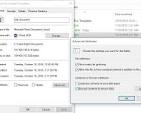
The Importance of Encrypted Files in Data Security
In today’s digital age, the security of our data is more important than ever. With cyber threats on the rise, it has become crucial to protect sensitive information from unauthorized access. One effective way to safeguard your data is through the use of encrypted files.
Encrypted files are essentially data that has been encoded in such a way that only authorized users with the decryption key can access it. This means that even if a malicious actor gains access to your files, they will be unable to read or make sense of the information without the proper key.
Encryption adds an extra layer of security to your files, making them virtually impenetrable to hackers and other unauthorized parties. Whether you are storing personal documents, financial records, or sensitive business information, encrypting your files ensures that they remain confidential and secure.
Many organizations and individuals rely on encryption to protect their most valuable data. By encrypting your files, you can mitigate the risk of data breaches and ensure compliance with privacy regulations such as GDPR and HIPAA.
It is important to choose strong encryption algorithms and secure key management practices to maximize the effectiveness of file encryption. Regularly updating your encryption methods and staying informed about new encryption technologies will help you stay ahead of potential security threats.
Overall, encrypted files play a critical role in maintaining data security in an increasingly connected world. By implementing robust encryption practices, you can safeguard your sensitive information and enjoy peace of mind knowing that your data is safe from prying eyes.
Top 6 Tips for Safeguarding Your Encrypted Files
- Use strong and unique passwords to encrypt your files.
- Regularly back up your encrypted files to prevent data loss.
- Keep your encryption software up to date to protect against vulnerabilities.
- Do not share your encryption keys or passwords with unauthorized individuals.
- Consider using two-factor authentication for an added layer of security.
- Be cautious when using public Wi-Fi networks to access or transmit encrypted files.
Use strong and unique passwords to encrypt your files.
When encrypting your files, it is crucial to use strong and unique passwords to enhance the security of your data. Strong passwords that are complex and difficult to guess provide an additional layer of protection against unauthorized access. By creating unique passwords for each encrypted file, you can further strengthen the security of your information and prevent potential breaches. Remembering to use a combination of letters, numbers, and special characters in your passwords will help ensure that your encrypted files remain secure and inaccessible to anyone without the proper credentials.
Regularly back up your encrypted files to prevent data loss.
Regularly backing up your encrypted files is a crucial step in ensuring the security and integrity of your data. By creating backups of your encrypted files, you can prevent potential data loss in the event of hardware failure, accidental deletion, or other unforeseen circumstances. Having multiple copies of your encrypted data stored in different locations adds an extra layer of protection and ensures that you can recover your information even if the original files become inaccessible. Remember, a comprehensive backup strategy is essential for maintaining the confidentiality and availability of your encrypted files.
Keep your encryption software up to date to protect against vulnerabilities.
To ensure the security of your encrypted files, it is essential to keep your encryption software up to date. By regularly updating your encryption tools, you can protect against vulnerabilities and stay ahead of potential security risks. Software updates often include patches for known vulnerabilities and enhancements to strengthen encryption methods, making it harder for cyber attackers to compromise your data. By staying proactive with software updates, you can maintain the integrity of your encrypted files and enhance overall data security.
Do not share your encryption keys or passwords with unauthorized individuals.
It is crucial to maintain the confidentiality of your encryption keys and passwords by refraining from sharing them with unauthorized individuals. These keys serve as the gateway to unlocking your encrypted files, and disclosing them to unauthorized parties can compromise the security of your sensitive data. By keeping your encryption keys and passwords private, you ensure that only trusted individuals have access to your encrypted files, enhancing the overall security of your data storage practices.
Consider using two-factor authentication for an added layer of security.
When it comes to safeguarding encrypted files, a valuable tip to enhance security is to consider implementing two-factor authentication. By requiring not only a password or decryption key but also a secondary form of verification, such as a code sent to your mobile device, two-factor authentication adds an extra layer of protection against unauthorized access. This additional security measure significantly reduces the risk of data breaches and ensures that only authorized users can decrypt and access sensitive information stored in encrypted files.
Be cautious when using public Wi-Fi networks to access or transmit encrypted files.
When utilizing encrypted files, it is essential to exercise caution when accessing or transmitting them over public Wi-Fi networks. Public Wi-Fi hotspots are often targets for cybercriminals looking to intercept sensitive data. Even though your files may be encrypted, transmitting them over unsecured networks can still pose a security risk. To enhance the protection of your encrypted files, consider using a virtual private network (VPN) or waiting to access them until you are on a secure and trusted network. By being mindful of the potential risks associated with public Wi-Fi, you can better safeguard your confidential information and maintain the integrity of your encrypted files.
